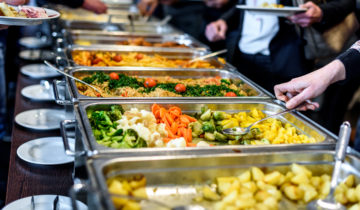Whether you are a restaurateur, a caterer, a baker or a pastry chef, your choice of food suppliers is crucial to your business! While the quality of the products you offer is a central factor, it’s not the only one you should consider. But how do you choose the right food supplier to meet your needs?
Read on for Cocotine’s list of vital prerequisites when it comes to selecting a supplier. We have looked at everything, from examining your needs to optimising your supply process, by way of considering CSR (corporate social responsibility) issues.
Examine your needs to choose the right food supplier
Unsurprisingly, your food supplier should be selected based on needs that are specific to your activities. Whether you are procuring fresh products, special ingredients or high-quality food staples, every business has different requirements:
- Required quantity of products: Depending on the quantity of products and number of weekly deliveries you need, you will want to make sure your supplier continuously produces and delivers those goods.
- Delivery sites: If your sites are spread out over different municipalities or even different countries, make sure your supplier has multiple plants, located at a reasonable distance from your delivery addresses to avoid excessive turnaround times.
- Peak business periods: Verify your supplier’s production capacity in connection with your peak periods and, above all, your supplier’s ability to satisfy your needs in case production at one of its plants is shut down for one reason or another.
- Innovative and/or custom products: Your business may require a product that depart from those that are available from traditional supply chains, which may necessitate the use of a foreign supplier. In that case, you should opt for a supplier whose accreditations you can verify. For example, it may be easier to select a European supplier.
Follow any specific regulations on food transport
Special transport conditions may be required for certain foods:
- maintenance of the cold chain
- compliance with delivery times
- product shelf life, etc.
Classify potential logistics suppliers based on the options they offer in order to comply with food safety regulations in the country or countries where you operate:
- depots with refrigeration equipment
- refrigerated transport
- temperature control processes, etc.
Note: If your food will travel through multiple countries, the associated regulations may be different from those in your supplier’s country. For example, following Brexit in 2021, customs formalities and changes in sanitary and phytosanitary controls were implemented between Europe and the United Kingdom. These have a direct impact on delivery lead times and on administrative and customs formalities for the import and export of fresh food products.
Optimise your supply to reduce your costs
Accurately scheduling your orders is a fundamental part of optimising your supplies and cutting your costs. Although frequent deliveries may be necessary to your food service business, an overstock will lead to financial losses. So, you should select a food supplier that can offer you the right balance between stored inventory and delivery frequency.
In addition to optimising your supply of provisions, you can also reduce your costs by negotiating prices and delivery terms based on the volume of your orders and the regularity of your purchases.
Secure your supplies
A reliable supply of goods is essential to preventing stock outages and ensuring your business continuity. Enquire about the supply chains used by your suppliers.
When you buy products from co-operatives like Cocotine, you are guaranteed continuous product availability thanks to their multiple producers. In addition to saving money on your products, you will also gain increased flexibility and reap the benefits of the spirit of solidarity embodied by co-operatives.
Secure your supplies with backup solutions in the event of any unforeseen circumstances. For example, this could involve access to alternative suppliers or the establishment of a buffer stock for your most critical products. By taking these precautions, you can avoid business disruptions, not to mention a lot of stress!
Assess each supplier’s environmental impact
Gauging a supplier’s environmental impact has become a major issue for companies when it comes to making a choice of supplier.
Consumers and authorities alike are becoming increasingly demanding when it comes to CSR policies, so you owe it to your business to be attentive to your food providers’ practices and commitments. Here are some points that we recommend you assess:
- waste management
- greenhouse gas emissions levels
- use of sustainable raw materials
- employee working conditions, etc.
You can also reduce your environmental footprint by prioritising local suppliers and short supply chains. If you’re based in the United Kingdom, Germany or Spain, why not source your food from France?
By taking CSR criteria into account in your choice of supplier, you can help build a more responsible, more sustainable economy!
Selecting the right food supplier is a strategic decision that guarantees you will be working with reliable, responsible partners that will contribute to your company’s success whilst respecting your values.
You can find all the articles you need from our agri-food experts on our blog.







